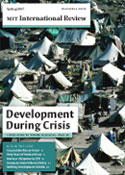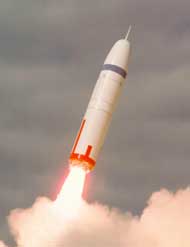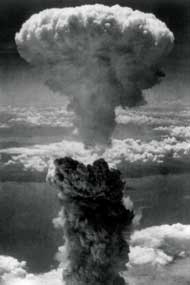- The prospect of nuclear weapon development in Iran and among radical terrorist organizations poses a grave threat to an over 60-year-old taboo.
- The tradition may survive, however, as rogue nations and groups begin to find deterrent power in their new weapons.
The most spectacular event of the past half century is one that did not occur. We have enjoyed 60 years without nuclear weapons exploded in anger.
What a stunning achievement—or, if not achievement, what stunning good fortune. In 1960, the British novelist C. P. Snow said on the front page of The New York Times that unless the nuclear powers drastically reduced their armaments, thermonuclear warfare within the decade was a “mathematical certainty.” Nobody appeared to think of Snow’s statement as extravagant.
We now have that “mathematical certainty” compounded more than four times, and no nuclear war. Can we make it through another half-a-dozen decades?
The first time that nuclear weapons might have been used after World War II was in 1950. U.S. and South Korean forces had retreated to a perimeter at the southern town of Pusan, and it was not clear that they could either hold out or evacuate. The question of nuclear defense arose, and the British Prime Minister, Clement Attlee, flew to Washington with the announced purpose of persuading President Truman not to let nuclear weapons be used. The successful landing at Inchon removed the danger, and we cannot know what might have happened if Inchon had failed. Nuclear weapons again went unused upon the disastrous assault by Chinese troops in the north of Korea.
Succeeding Truman, President Eisenhower saw NATO facing a hugely superior military adversary, and elevated nuclear weapons from last resort to first resort. Shortly after inauguration, Secretary of State John Foster Dulles said, in the National Security Council, “Somehow or other we must manage to remove the taboo from the use of these weapons.” A few weeks later, the President approved the following statement: “In the event of hostilities, the United States will consider nuclear weapons to be as available for use as other munitions.” Six months later, the U.S. position was that nuclear weapons “must now be treated as in fact having become conventional.”
The Johnson administration shows a striking contrast. In September 1964, Johnson said publicly, “Make no mistake, there is no such thing as a conventional nuclear weapon. For 19 peril-filled years no nation has loosed the atom against another. To do so now is a political decision of the highest order.”
I interpret this as Johnson’s belief that 19 years without nuclear war was an investment to be treasured.
Nixon did not use nuclear weapons in Vietnam.
Golda Meir, Israeli prime minister in 1973, did not authorize nuclear weapons against Egyptian armies that had successfully crossed the Suez Canal and were perfect targets for nuclear attack, there being no civilians in the vicinity.
Margaret Thatcher did not consider nuclear weapons against naval vessels in defending the Falkland Islands against Argentina.
And most astonishingly, the Soviet Union fought a long, bloody, and disastrous war in Afghanistan without recourse to nuclear weapons. Even the Russians were awed, apparently, by Johnson’s 19 “peril-filled years,” which by then had stretched to four decades.
Those 19 years have stretched to 60. The taboo that Ike appeared to denigrate, or pretended to denigrate, but that awed President Johnson a decade later, has become a powerful tradition of nearly universal recognition.
An immediate question is whether we can expect Indian and Pakistani leaders to be adequately in awe of the weapons they now both possess. There are two helpful possibilities. One is that they share the inhibition—appreciate the taboo—that I have been discussing. The other is that they will recognize, as the United States and the Soviet Union did, that the prospect of nuclear retaliation makes any initiation of nuclear war nearly unthinkable. The risk is that one or the other may confront the kind of military emergency that invites some limited experiment with the weapons, and there is no history to tell us, or to tell them, what happens next.
The next threats from nuclear weapons may emerge from Iran, North Korea, or possibly some terrorist bodies. Is there any hope that they will have absorbed the nearly universal inhibition against the use of nuclear weapons, or will at least be inhibited by the recognition that the taboo enjoys widespread acclaim?
Part of the answer will depend on whether the United States recognizes that inhibition, and especially on whether the United States recognizes it as an asset to be cherished, enhanced, and protected, or, like John Foster Dulles in Eisenhower’s cabinet, believes that “somehow or other we must manage to remove the taboo from the use of these weapons.”
There is much discussion these days of whether or not “deterrence” has had its day and no longer has much of a role in America’s security. There is no Soviet Union to deter; the Russians are more worried about Chechnya than about the United States; the Chinese seem no more interested in military risks over Taiwan than Khrushchev really was over Berlin; and terrorists can’t be deterred anyway—we don’t know what they value that we might threaten, or who or where they are.
I expect that we may come to a new respect for “deterrence.” If Iran should, despite every diplomatic effort to prevent it, acquire a few nuclear weapons, we may discover again what it is like to be the deterred one, not the one doing the deterring (I consider us—NATO—as having been deterred from intervening in Hungary in 1956 and Czechoslovakia in 1968.). I also consider it crucial that Iran learn to think, if it hasn’t already learned to think, in terms of deterrence.
What else can Iran accomplish, except possibly the destruction of its own system, with a few nuclear warheads? Nuclear warheads should be too precious to give away or to sell, too precious to “waste” killing people when they could, held in reserve, make the United States, or Russia, or any other nation, hesitant to consider military action. What nuclear weapons have been used for, effectively, for 60 years has neither been on the battlefield nor on populations; they have been used for influence.
A potential serious difference between Iran’s nuclear thinking and that of India and Pakistan is that for many decades, Indians and Pakistanis have been participating in an international nuclear dialogue—at the Aspen Institute, at the Institute for Strategic Studies in London, at think tanks and conferences around the world. I never saw an Iranian, let alone a North Korean. Indians and Pakistanis, of course, read and comprehend English fluently and have had access to publications in English from institutes and publishing houses in Sweden, Italy, Germany and, of course, England and America. I believe a way must be found to make some Iranian participation in nuclear discourse legitimate.
What about terrorists? Any organization that gets enough fissile material to make a bomb will require at least six, probably more, highly qualified scientists and numerous machinists and technologists, working in seclusion away from families and occupations for at least weeks, maybe months, with nothing much to talk about except what the “bomb” might be used for, by whom. They are likely to feel justified, by their contribution, to have some claim in deciding the use of the nuclear device (The British Parliament in 1950 considered itself, as a partner in the development of the atomic bomb, qualified to advise Truman on possible use of the bomb in Korea.).
They will discover, over weeks of arguing, that the most effective use of the bomb, from a terrorist perspective, will be for influence. Possessing a nuclear device, if they can demonstrate possession—and I believe they can, if they have it, without detonating it—will give them something of the status of a nation. Threatening to use it against military targets, and keeping it intact if the threat is successful, may appeal to them more than expending it in a destructive act. Even terrorists may consider destroying large numbers of people and structures less satisfying than keeping a major nation at bay.
The United States was slow to learn, but eventually learned (in 1961), that nuclear warheads demand exceptionally secure custody—against accident, mischief, theft, sabotage, or a “Strangelove-like” unauthorized attack. There is always the dilemma: Reward violators of the Nonproliferation Treaty by offering the technology to keep the warheads secure? At least we can try to educate the new members of the nuclear club about what we didn’t appreciate for our first 15 years.
I know of no argument in favor of the Comprehensive Test Ban Treaty, which the U.S. Senate rejected in 1999, more powerful than the potential of that treaty to enhance the nearly universal revulsion against nuclear weapons. The symbolic effect of some 170 nations ratifying the Treaty, which is nominally only about testing, should add to the convention that nuclear weapons are not to be used, and that any nation that does use nuclear weapons will be judged the violator of a hard-earned tradition of non-use. When the Treaty is again before the Senate, as I hope it will be, this major benefit should not go unrecognized.
The most critical question about nuclear weapons for the United States Government under George W. Bush or under anyone else is whether the widespread taboo against nuclear weapons, and its inhibition on their use, is in our favor or against us. If it is in our interest, as I believe is obvious, advertising our continued dependence on nuclear weapons and our need for new nuclear capabilities and probably new nuclear tests—let alone ever using them against an enemy—has to be weighed against the corrosive effect on a nearly universal attitude that has been cultivated through universal abstinence for over 60 years.






